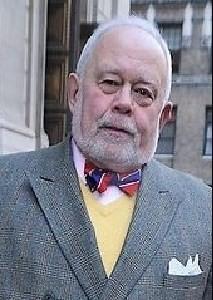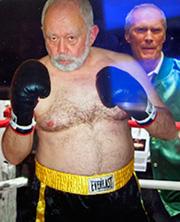Deceased September 20, 2021
View alumni profile (log in required)
Read obituary
In Memory

First, from college years: Chauncey and I laughed a lot. I was dating my future wife, Alison, and Chauncey gave us a pre-engagement present of a baby’s potty seat to use as a drink mixer, perfect given his off-beat personality. After a while, we converted it to a goldfish bowl, and our pet survived that whole senior year. Our third roommate was a delightful but unmitigated slob who invariably dropped his clothes on the floor when getting ready for bed. Chauncey was no athlete, but he developed a powerful drop kick to clear the floor, and the pile of dirty clothing remained under the roomie’s bed until he had nothing to wear, crawled under, and took everything to the laundry.
That year, Chauncey introduced me to a lifelong love for opera. Alison got a first job after college, working to help a legally blind teen, the granddaughter of former president Herbert Hoover, and teaching at Rosemary Hall School. Alison persuaded the Hoovers to rent the center box at the Saturday matinee of the Met Opera to enrich the education of the youngster, and Alison took her almost every week. There were eight seats, and there were never eight 15-year-olds who wanted to go, so I was able to repay Chauncey in spades.
Shortly afterwards, Chauncey was drafted. He had majored in classics, but had never been to Europe, and spoke often of how eager he was to explore classical sites. But first, he was sent to Fort Jackson in South Carolina. He was eager to get through basic, since his mates mocked him for lying on his bed reading in Latin while they played cards, read pop magazines, and joked around. They thought he was from another world.
At a certain point, the company officer said at roll call, “Who can read?” When, of course, no one volunteered, the lieutenant said, “Howell, you went to college. You’re the new company clerk.” Oh, the wonders of an Amherst degree! Then, basic training finished, and they shipped out to Germany. Chauncey wrote, “Finally, Europe.” Without Chauncey, the lieutenant’s reports were barely literate, and he was in hot water with the captain. Shortly, Chauncey got orders detaching him from the unit and ordering him back to Fort Jackson, where he spent the next two years, clerking away.
When the Berlin Wall crisis occurred in 1961, President Kennedy issued a call for 150,000 soldiers. I almost volunteered, although I was in graduate school, but it became clear the military only wanted trained men. Chauncey was called up and sent back to Fort Jackson to write training reports for draftees for another year. No wonder he went to the Big Apple and began writing and interviewing for Women’s Wear Daily after completing his service. He had the gift of gab, and he talked his way into the job even though he was unsophisticated about food and travel. That started his career as a restaurant critic and Man About Town interviewer on New York media.
My wife’s parents had fallen in love with Chauncey, and they invited him frequently for dinner to their home in New Canaan. He had acquired an old motorcycle, and he rode out on weekends. Chauncey, the esthete, riding up the Merritt Parkway on a motorcycle was as incongruous as you can imagine.

Meanwhile, Chauncey’s career on New York television continued to grow. He was not a newscaster or a journalist but an interviewer. He had a unique ability to relate to ordinary people, to get them to relax and enjoy themselves while being filmed. He interviewed the high and mighty, but he most enjoyed going out on the street and speaking with ordinary people. He was warm, had a flair for languages, and told funny, zany stories and anecdotes. He could schmooze in Yiddish, Italian, Spanish, and various New York dialects. He brought out the best in people, in a light-hearted, affectionate way. Before his pieces aired, Chauncey edited them, adding music and interjections. Every day, his Man About Town program appeared in the late afternoon on WABC or WNBC, and he was awarded five Emmys for his work.
For a sample of Chauncey’s TV interviews, search “Chauncey Howell on YouTube” on the Internet, where you will find more than a hundred vignettes of Chauncey’s work. My favorite is “The Osso Buco Song” conducted in an Italian restaurant in Queens with the owners and chef of a local trattoria. At one point, they all burst out in Italian into a fake operetta about veal shanks.
During all these years, I was a professor at Wellesley College and for eight years a State Department official in Washington. Alison and I saw him infrequently, but we remained close friends, despite our physical separation. Chauncey will be remembered by everyone in the class of 1957 for his humorous after-dinner remarks, which were always one of the highlights of all our class reunions. He was one-of-a-kind, a character, and unforgettable. Writing these notes has been a catharsis for me. Chauncey enriched my life, and I am deeply grateful for his friendship.
Alan Schechter ’57